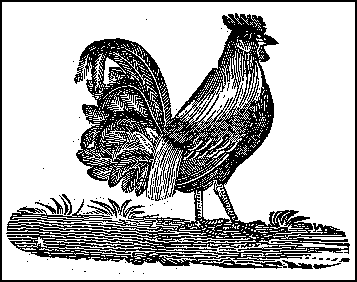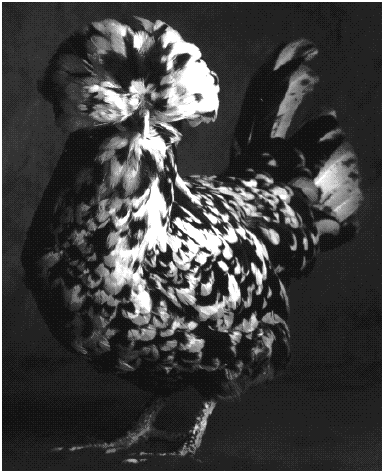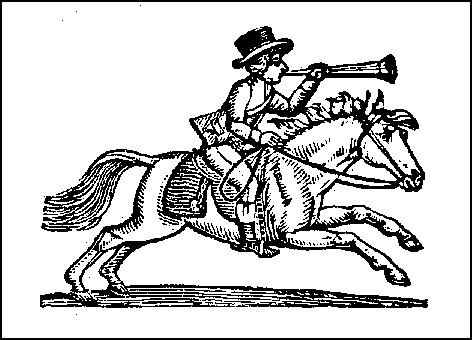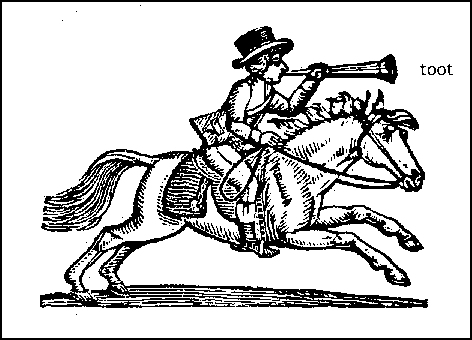Fairest
Fowl
Portraits of
Championship
Chickens
Ira Glass
(Photographs by
Tamara Staples)
(Chronicle)

It's the creature we carry around in our souls to resonate with those out there in what they call the real world. For instance, if you are nuts for cats, you probably have a feline self meandering around inside of you. The moment you run into one in the street or at the pound or, best, in your house --- there's a powerful feeling that you have just run into a brother or a sister. Mary Midkiff, for example, in She Flies without Wings, [see below] is convinced that her best friends are all horses, and even confesses, "I often think of myself as a horse."
For some of us, our creature of choice is a bird. For a very few of us ---at least for the few of us brave enough to admit it --- it's a chicken. There are some limits to this animal love, though...at least with poultry. Those of us who are chicken heads don't necessarily have the powerful resonance of the horse lady. Which is to say, when I sit down to a Chicken Dee-lite™ snack, I don't necessarily think of myself as a cannibal.
At the same time, I like raising them, I like watching them, and most especially I like that superb moment when you look through the clear plastic of the incubator and your twenty or so eggs that have been slowly and mutely baking there for three weeks at 99.5º split apart and suddenly there's an army of peeping, bug-eyed, two-legged slippery wet creatures who will soon enough turn into creatures of some grace, if not sporting too much in the way of brain cells.
For the last few years, I have been raising fowl, but not the commercial variety --- those Rhode Island Reds or White Leghorns that are designed for drumsticks at KFC, or to have their newly delivered babies scrambled up with mushrooms and butter and tarragon yum.
No, I'm looking for the more risible members of the chicken world. My favorite reading matter --- next to Harpers, The London Review of Books, and Diaper Bondage --- is the Poultry Press. In it I've found some birds that the professionals call "The Fancy." If you don't think chickens can, in any way, be fancy --- you might take a gander, as it were, at the thirty that Staples and Glass have collected together here in The Fairest Fowl.
Take, for example, the White-Crested Black Polish. They are birds with glossy black feathers but instead of the usual red comb atop their little pea-heads, they sport a waterfall of white feathers...all of which comes in sharp contrast to what the experts call the "beetle-green sheen" down below.
Or there's the Silkie, chickens with black skin and black feet and feathers --- white or black or "blue" --- which are not feathers at all but more like hair, sticking out all over the place. (Some also appear with hair growing down their legs, like the women in France. Unlike most French ladies, however, they can sport a heavy beard as well.) They're so odd that they've proved to be a show-stopper where ever I've taken them.
I don't normally travel with chickens, except in their earliest stage --- they gum up the seats something awful --- but I have taken some Polish and Silky eggs down to my winter home and hatched them there. They excite much comment among my Mexican neighbors for whom chickens are either for frying or setting loose in a ring to murder each other amidst much noise, smoke, betting, and fire-water. That I would raise "gallos" just to look at seems to make them wonder about the brain-power of those of us who hail from the far north.
Ira Glass --- author of The Fairest Fowl and a bothersome representative of the demise of National Public Radio (radio noise instead of radio art) --- is not exactly an expert on The Fancy. For example, he talks about the disposition of some of the birds pictured so gloriously in The Fairest Fowl, but he doesn't mention the outright viciousness of a few of these show birds. Crested Polish for example, can be mean as hell. I gave a golden-laced rooster to one of my friends, and every day he has to chase the dumbhead away from his two young sons. The bird attacks them regularly, thinking they are some exotic breed of chicken --- and would eviscerate them in a minute if he had a chance. Glass also tells us that Silkies have a reputation for being "pleasant, low-key, gentle." Even though they are a treat for the eyes, those of us who have been around them some time would probably better classify them as "stupid."
 In my experience, the smartest chicken I ever ran across was a Bearded Quail Belgian D'Anvers Bantam, which is quite a handle for such a compact little thing. Mine was trained to jump up on my shoulder when I held out my arm, but, alas, before it reached age two, the neighbor German Shepherd barged into my yard and ate it up, beard and all. My neighbor couldn't figure out why I got so excited about what he referred to as "just some dumb fuckin' chicken." I would have hauled the bastard into court if it didn't turn out that the bird-brains who run our community had long ago outlawed the raising of poultry within city limits.
In my experience, the smartest chicken I ever ran across was a Bearded Quail Belgian D'Anvers Bantam, which is quite a handle for such a compact little thing. Mine was trained to jump up on my shoulder when I held out my arm, but, alas, before it reached age two, the neighbor German Shepherd barged into my yard and ate it up, beard and all. My neighbor couldn't figure out why I got so excited about what he referred to as "just some dumb fuckin' chicken." I would have hauled the bastard into court if it didn't turn out that the bird-brains who run our community had long ago outlawed the raising of poultry within city limits.
I would guess that --- unlike a cat or a horse --- it isn't all that easy to feel much affection for a Silver Spangled Hamburg or a Dorking. But sometimes, when I watch a couple of them running across the lawn, I have to reflect on the fact that they are the closest relative we have to the dinosaurs, having evolved from the same line. When they chase each other (and the kids) around the yard, you and I are witnessing a moment right out of evolution, right there before our eyes.
Without
Wings
How Horses Touch
A Woman's Soul
Mary D. Midkiff
(Delacorte)

As a young girl, I was a foal; in my teens, as awkward yearling. During the years when I began to explore a wider world, meeting new challenges, I saw myself as a sleek and athletic racehorse, setting records on the track. Always as I reached each new season, I took comfort and instructions from other horses, the ones who response to change was so much more instinctive than my own...Today I am a mature horse.
Mary D. Midkiff grew up in Kentucky blue-grass country and from her earliest years, was smitten with horses. Her father managed a breeding farm, her grandfather was a "hardboot horseman" --- one who "dealt only in hard cash and hard whiskey." Mary galloped about, and "became good at whinnying and snorting." When she first met a horse, she felt "fear and awe, respect and caution, excitement and reserve."
She was hired on at fifteen as a groom. She tells us she had "oily hair, pimples, and braces on my teeth." But the horses didn't care what she looked like or how she felt.
A new stallion was brought in. "He was full of himself, as stallions often are," she says. Her job was to clean his stall, and she found that when he looked at her, he developed an erection.
I was surprised to find that the harder I worked and the more I sweated, the more excited the horse became. Finally he began flinging his penis against his stomach, a form of masturbation common among stallions.
National Velvet this ain't.
Ms. Midkiff tells us that in her return to college, she had a brief fling with feminism. But, "I found my perennial sense of otherness surfacing again." Her belief in radical activities began to desert her, and she returned to her first love --- caring for (and being cared by) horses. Indeed, there is a great feeling here, one that comes from what she calls "following your passion." She knows the world of Equus, is forceful as she conveys to us the sensitivity of her charges, and her reciprocal sensitivity:
Instead of speaking with the tools and words of human communication, she speaks to the horse through her movements and her spirit. In exchange, she regains her wonder, and her wonder replenishes her.
Ms. Midkiff is an agile writer. At times, however, she develops a certain klunkiness, loses some of her confidence and art. Mostly it happens when she drifts away from the world of horses, tries to write about people (and their emotions). Instead of showing us the change she began to feel towards her feminist teacher, she merely says, "I began to notice that my professor often seemed angry and almost never laughed."
This is not to say that she's not an honorable revealer of the self. The early onset of menopause (thirty-seven) created a depression that was hard to shake,
The body that served me so well for so long was betraying me in significant ways.
Typically, her respite came from horses. While she was having her crises, Diva, her ten-year-old mare, began to act strangely as well. She initiated hormone therapy, equine massage, chiropracty, and herbs. She found a corresponding therapy to be helpful for her. "We both improved, but my improvements were more dramatic."
She Flies without Wings will be a joy for those who love horses, and the world of races and shows and competition. For others, however, there may be some strain, mostly having to do with the author's unusual view of humans. She speaks of friends and the world in general in equestrian terms. This is her friend Maggie, her room-mate in school,
who materialized like a rogue horse on a mountaintop and came down to call me away from my herd. As a curious young mare, I followed her into unfamiliar canyon and forests to see what lay beyond my own territory. She showed me how to select leaves and buds with the best taste and texture, how to ring my tail and shake my mane in the cool breezes, how to prance and snort. But when I asked her to come a graze and lie in the sun with my herd, she shook her head with boredom and nudged me to trot away with her instead.
